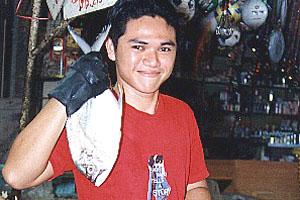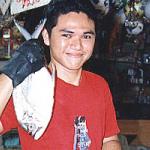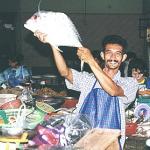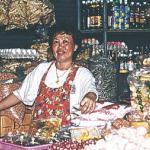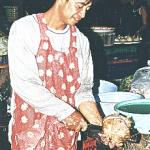Ob-la-di, Ob-la-da
Translated from Danish by Andrew Huddleston
[Read the Danish version]
That good old Beatles song about Desmond and his barrow in a marketplace seems to sing in my ears on this early morning in a Thai market - but Desmond isn't here.
"Happy ever after in the market place. Desmond lets the children lend a hand".
Inspiration can come from the most unexpected quarters. For example while wandering around among half and whole pigs, rows and rows of gigantic fish and thousands of tomatoes, cucumbers and exotic fruits - and then automatically beginning to sing an old Beatles hit. "Ob-la-di, Ob-la-da - life goes on, bra...."
But life goes on. And it goes on very well in this marketplace. Even though there's no sign of Desmond. He's not here. Or perhaps there are hundreds of him here. Perhaps not THAT Desmond who got his Molly in the Beatles version. But THAT Desmond who is minding his barrow or his stall at the marketplace. And who also "lets the children lend a hand".
The market is a great proportion of everyday existence for hundreds and an important part of existence for many thousands of Thais on Phuket, the Thai holiday island. The main town, Phuket Town lies on the east coast. In miles not so very far from the tourist centres on the west coast. But as far as daily life is concerned it is light years away. Especially in the early morning hours it is a part of the real Thai daily life, beckoning you to join in and experience it - with no admission charge.
The Thai capital, Bangkok, has its spectacular floating markets in Thonburi and Damnoen Saduak, where the market people move themselves and their wares around on the small sampans. Over the years the floating markets have developed into a mixture of ancient culture and a tourist experience that the tour operators even arrange excursions to. There's nothing floating about in the markets in Phuket Town. Not tourism either. The markets are still a necessary part of daily life for the local population. They are tradition's authentic answer to the supermarket's food department. And often to the non-food departments too.
Hustle and bustle
Almost all of life's necessities can be bought and are bought at the markets. Phuket Town has a couple of very significant markets which, moreover, are just about in the heart of the town. Morning wanderers will experience a hustle and bustle beyond compare close by Phuket Town's big international department store, Robinson, which for many tourists is a natural place to visit in the main town. But the department store is not much different from stores in all other places in the world. The vegetables are lined up in refrigerators marked with explanatory texts in Thai and English. Robinson has a meat department with vacuum-packed products and a delicatessen counter. And the early morning wanderer will not experience the department store because it doesn't open until 10 a.m.
By that time its market neighbours have packed up for the day. The market next to Robinson already comes to life in the wee small hours. The traders roll in with their wares and set up their stalls in exactly the same way they did the day before. And as they will a day later. The only difference is that the eggs, fish, poultry, vegetables, fruit - and whatever else they have to offer - are absolutely fresh.
Customers arrive from near and far. The first of them shortly after the produce is in place. First come, first served... And the lively trading continues for several hours. Private customers come to shop. Not to fill the fridge, only food for today. The next morning they'll be back to buy supplies for the family for another day. Buyers from large and small hotels and restaurants arrive with the day's shopping list which they give to their regular suppliers. Fully expecting that their pick-up will be filled with first-class wares. Otherwise the suppliers won't be so regular any more. There are plenty others to choose from.
While the goods are being loaded there's time for a solid breakfast in one of the market's small restaurants which only have Thai food on the menu. 20-30 Baht is enough to fill you up and then you can journey home with new-laid eggs, freshly slaughtered chickens, freshly caught fish, newly-picked tomatoes and tons of other produce.
Good Buddha words
There are others hanging around the market just about constantly until it closes in the early morning. The Buddhist begging monks in their saffron-yellow robes. They have their regular pitch at the market where local Thais make their contribution to maintaining the monks' life at the temple. Some hand out a couple of cucumbers, others fish, eggs or a little money. The monks acknowledge the gift with good Buddha words and wishes of good luck.
For those who are not early-risers but who want to experience market life there are excellent opportunities later in the day. Phuket Town's other big permanent marketplace spreads along both sides of Ranong Road, which is the town's main bus thoroughfare. It is from here that the local buses leave for Patong, Rawai, Karon and Kata, Kamala and other destinations on the island. On one side of Ranong Road a fairy-tale world of fruit and vegetables is revealed. On the other side is an indoor eldorado of fish, poultry and meat.
The market at Ranong Road seethes with life almost all day long. But is slightly lazier in the afternoon hours when the heat is at its worst and when hardly anyone can be bothered to shop. All in all the market functions according to the same concept as the night market next to the Robinson department store. The goods are fresh and cheap. And for anyone who just wants to breathe in the experience it is saturated with visual impressions. And many of the impressions are ideal to help one to consider revising one's view of how things can be done. The Western, vacuum-packed and date-stamped reality gets a shot across the bows. Bar codes and declarations of contents are unknown terms at the market. It is first and foremost a question of experience, of evaluating by looking and squeezing.
The food markets destroy the impression that so many tourist have of Thai business methods. The prices are, as a rule, absolutely fixed. A kilo of papaya costs what a kilo of papaya costs that day. 10 fresh eggs of the good size cost 23 or 25 Baht - without discussion. You neither can, nor need to, barter here.
The Sunday market
There are however rich possibilities to haggle on Sunday. While the food markets are a weekday performance, Sunday is the great day in Phuket Town as far as non-food is concerned. The Sunday market close to the town's big bus station, which has connections to other parts of the country, is an Eastern chaos of everything possible. It is the local population's answer to the many trading stands that tourists often only experience in the heart of the tourist centres. And they are considerably more fun. A par of Levis that have never been anywhere near the Levis factory are passed over the counter for a couple of hundred Baht. That's if you are a "farang" - a foreigner. The starting price is probably rather higher. There has to be room to bargain. If it's a Thai on the buying side of the counter the price can easily tumble even more.
T shirts, shoes, glassware, CDs, cassettes, toys, electronic goods, posters, books. And much, much more. "You name it ...." the Thai traders could easily claim if it wasn't for the fact that their English is a bit limited. Their colleagues in the tourist centres are far more shrewd when dealing with international customers. Many foreign visitors also find their way to the Sunday market in Phuket Town. But the market, luckily, is clearly first and foremost a trading place for the local population.
Family shopping
The Sunday market gathers steam in the early afternoon and then it is just a matter of breathing in the experiences. Trading is done in the good old-fashioned way and both Phuket Town citizens and people form other parts of the island lug their purchases around with them. Thai families enjoy this weekly - or monthly - trip to the market. New clothes for the children. A set of screwdrivers for Dad. A lipstick and some rouge for Mum. Callow youths bargaining for a set of oversized speakers for their car. Others are satisfied with a couple of Manchester United stickers for a few Baht. And everything at far more acceptable prices than (almost) the same thing would have cost in one of the supermarkets. Perhaps with somewhat a somewhat more authentic Levis trademark but at four times the price. Hunger can be satisfied at one of the many small restaurants which have been established specially for today. And before the journey home - on foot round the corner, the whole family on the same small motorbike or by local bus out to the surrounding area - the last things are bought. Perhaps some sweet things for grandma who no longer has the strength to come into the weekly market. Or perhaps a couple of heavy water melons from the part of the market that sells fruit and vegetables.
Towards evening the traders pack up their goods. The Sunday market scenery is stowed away, ready for the next time, exactly a week from now. These are regular routines and everyone knows their role. The stalls are often staffed by whole families where young and old, big and small pull their weight. Desmond lets the children lend a hand.
Ob-la-di, Ob-la-da - life goes on, bra....
 ThingsAsian
ThingsAsian